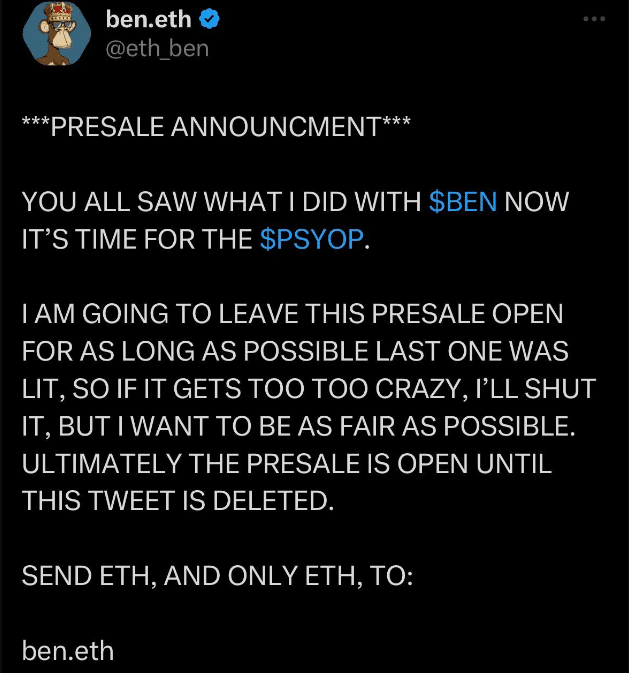May has been wrought with twists and turns. From the rise of $PEPE bringing renewed excitement to crypto and NFTs to an unprecedented rugging from anonymous creator hopeexist, it’s become difficult for Web3 to focus on anything besides memecoins and scandals.
And we’re not quite out of the woods yet. Thanks to Ben.eth, the inhabitants of the metaverse might be in for another bout of controversy. Having made a significant splash with his $BEN and $PSYOP memecoins, the pseudonymous collector has returned to further expand his journey to infamy with a new token offering: $LOYAL.
What is $LOYAL?
$LOYAL is the third (and perhaps last?) memecoin in the Ben.eth saga. While $BEN was created simply to be a new, viral memecoin, and $PSYOP was launched to be the sequel which would also yield unspecified utility, $LOYAL is supposedly something else entirely.
As per a tweet by the controversial crypto content creator and $BEN ecosystem lead, Bitboy, $LOYAL will be “the token of a new DEX/Memecoin Launchpad named PsyDex.”
“Twenty-five percent of LP profits on $LOYAL will get airdropped each week to $BEN coin holders. Twenty-five percent of LP profits on $LOYAL will go to fund our crypto adoption initiatives with $BEN,” Bitboy said in a thread following his initial tweet.
“The Memecoin Launchpad will allow crowdfunding that automatically locks a percentage for liquidity. It’s rug-proof. Many more things to come and details to work out, but this is weeks into development from the top-shelf dev team.”
Considering the delay and subsequent lackluster response to the launch of $PSYOP, it’s anyone’s guess whether or not what Bitboy says might be true or if efforts might fall by the wayside. But as of writing, the $LOYAL contract had only just been released.
Yet, what might potentially be even more interesting about the $LOYAL launch (even more so than its tokenomics) is the new layer of controversy that it, and Ben.eth’s previous comments, have inspired.
Copycats galore
Although there is plenty to be said about $LOYAL and Ben.eth’s previous two coins, it might be his infamous tweet, rather than token endeavors, that has made the most significant impact on Web3 culture thus far. Originally published as a statement to incite potential investors to join a $PSYOP presale, it has since become both a meme format and a call to action for numerous other influencers.

Though Ben.eth’s above tweet has since been deleted, various versions of his original vernacular have been reissued throughout Web3. Surprisingly, some of these coopting efforts have actually become major breadwinners for users.
Pauly simply asked for money and has raised over $104,781
I asked for a new iPhone after my twitter space with 2,300 crashed and I am the devil pic.twitter.com/1HPHYe7ims
— borovik.eth (@3orovik) May 30, 2023
Everyone with any sort of following is trying to figure out how they can get away with running some sort of “send ETH to this address” scheme without totally ruining their reputations🤦
“but some is going to charity”
“just an experiment”
“my version is different”
“trust me bro” pic.twitter.com/N5weAOzM2H— Zeneca 🔮 (@Zeneca) May 31, 2023
Notably, pseudonymous collector Pauly received over $1.2 million (and counting) simply by asking his followers to send ETH to his YouGetNothing.eth wallet while expecting nothing in return. But not everyone has been successful, and most creators and collectors in Web3 seem to be opposed to such ventures for obvious reasons.
Instead of sending eth to random addresses to get nothing, why not look through the profiles of artists that haven’t had a sale in a while and send eth in exchange for art and good karma.
— BETTY (@betty_nft) May 30, 2023
Ben.eth’s tweet isn’t the only thing inspiring harmful copycats. A slew of new memecoins has cropped up, aiming to mimic the influencer’s speech and persona in hopes of achieving similar success. Two such endeavors that have been making the rounds are $DAVE and $FINALE.
Although the rumor that $DAVE was under the same management as $BEN was quickly nipped in the bud by Bitboy, the narrative surrounding $FINALE is a bit more complex. Because at face value, and thanks to Ben.eth’s failure to denounce the coin, the token feels very much on brand with both $BEN and $PSYOP — and has gained some traction in response.
Furthermore, the Finale Token, launched on May 29, continues to reference both $BEN and $PSYOP on social media as a marketing tactic. Although the coin seemingly got a green pass from Ben.eth, Bitboy has remained steadfast that while its progenitors might be loosely affiliated with the $BEN ecosystem, it is not an accepted part of his or Ben.eth’s ongoing efforts.
The legality of this whole spectacle
While the NFT community continues to make their own judgments about what Ben.eth has created, what will ultimately matter most is the legality of his actions. Ben.eth may seem uninterested in the potential ramifications of his memecoin empire. But with attorney Mike Kanovitz already considering filing a class action lawsuit against the influencer, it may only be a matter of time until Web3 sees the true scope of this complex situation.
In the opinion of Andrew Rossow — an attorney and journalist who focuses on fintech and intellectual property law — although it’s still much too early to tell what the Ben.eth saga will mean for memecoins, its legal implications should be of interest to everyone within Web3.
“I think anybody participating in the space that is taking on the position of offering up an opportunity for another party or group of people to invest should take this very seriously,” Rossow said in an interview with nft now. “Reason being is when you ask somebody to invest their money into an effort, an enterprise, an initiative, you take on an entirely different role and responsibility that we are now just starting to peel the layers back on and hoping for more regulatory clarity on.”
“If people are willing to ask others for their money to invest in something […] they need to be open to the potential of probes and SEC conversations.”
Andrew Rossow, ESQ
Rossow made it clear that the Ben.eth situation is far too fresh to truly dissect, but that the ongoing Ripple vs. SEC lawsuit and further regulatory considerations made by the SEC will play a major role in if and when memecoin creators (like Ben.eth) or even general NFT project founders should be concerned.
“The SEC is going to have to get involved, whether we like it or not. It’s just a matter of if you want to step foot in these waters, you have to be realistic,” said Rossow. “If people are willing to ask others for their money to invest in something […] they need to be open to the potential of probes and SEC conversations.”
Although Rossow digressed that there are larger distinctions that need to be made between performance art for the sake of social commentary versus for the sake of bringing in investors, he noted that a court-set precedent involving one of the many controversies present int the NFT space (like memecoins) would give Web3 a starting place for creating a symbiotic relationship with regulators.
For now, as the Ben.eth tale continues to be written, it seems the only thing that memecoin traders, NFT collectors, and enthusiasts on the sidelines can do is wait and see.










